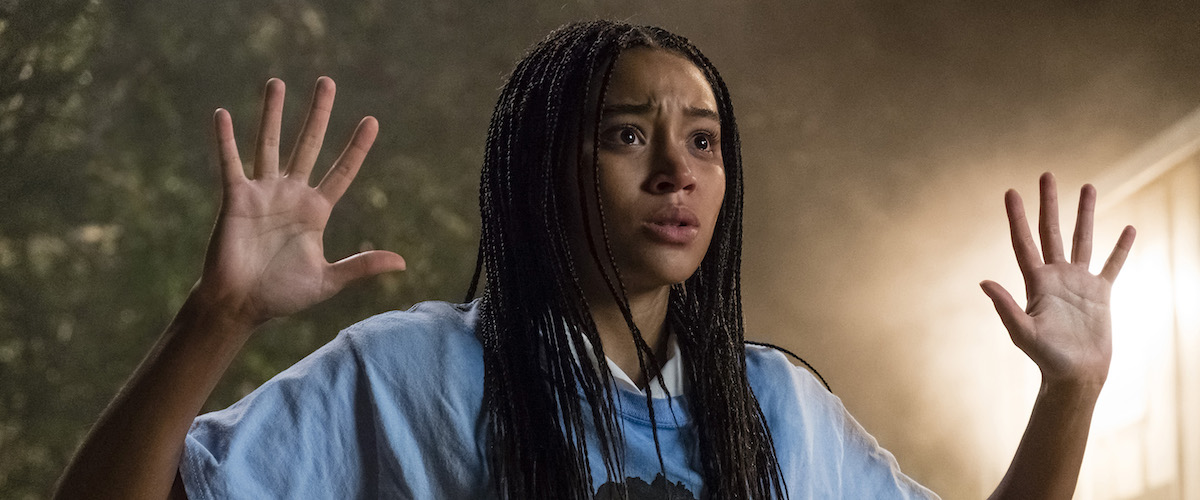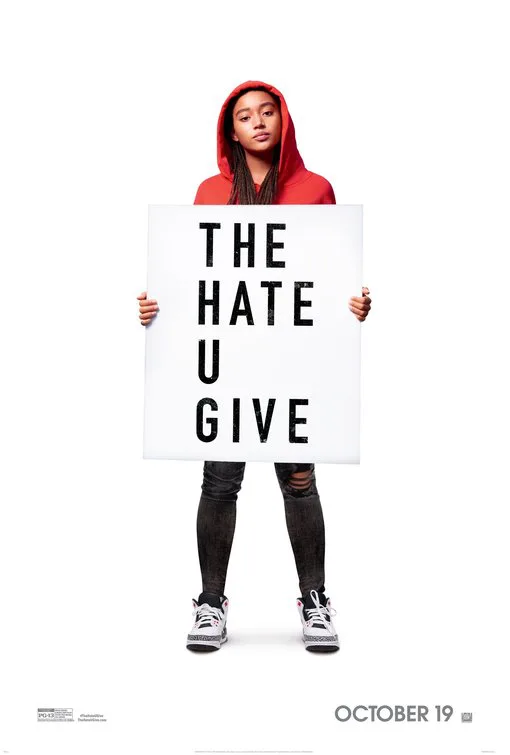“The Hate U Give Little Infants Fucks Everybody.” The phrase originally made popular in the ’90s by Tupac as an acronym for “THUG LIFE,” inspired another work of art, Angie Thomas’ debut novel, The Hate U Give. The book so successfully connected with a young generation grappling with gun violence and police brutality that it has remained on The New York Times’ bestseller list since its release in February 2017. Now, the film adaptation of its powerful story will attempt to reach an even bigger audience with its Black Lives Matter message.
Both the book and movie follow Starr Carter, a black teenager well-versed in code-switching between her black community in Garden Heights and the prep school her parents send her and her siblings to in the ostentatiously white and wealthy Williamson neighborhood. When the audience first meets her in George Tillman Jr.’s film, her stern-voiced dad, Maverick (Russell Hornsby), is teaching his children what to do if a police officer stops the car they’re in. Put their hands on the dashboard; do as they say. It’s the difference between life and death. She is nine-years-old in this scene, her older brother is ten and the youngest member of the Carter family is just a year old, still fussing in his mother’s arms.
The story then jumps forward to when Starr (Amandla Stenberg) is a vibrant 16-year-old who plays on her school’s basketball team and finds love in a goofy yet earnest white classmate named Chris (K.J. Apa). But the unintended consequence of having one foot in two different social circles is that you never really feel balanced in either. She feels out-of-place both at her white prep school where white kids love to use black slang and at a neighborhood party her friend brings her to so Starr can help her out in a fight. Starr’s awkward feelings are pushed aside for a moment when an old childhood friend and first crush, Khalil (Algee Smith), approaches her with a smile completed by dimples. A fight breaks out at the party, interrupting their meet-cute, and the two drive off in Khalil’s car. On their way back to Starr’s home, the two teens reminisce about old times and even share a kiss. Then, red and blue lights flash. A cop pulls them over for some unexplained reason, and Khalil gets defensive. Starr tries to coach him through her father’s warnings: hands on the dashboard, do what they say. When the cop walks away to run Khalil’s license, the teenager carelessly reaches for his hairbrush to pass the time. Shots ring out, killing Khalil. The officer handcuffs Starr next to her dying friend. He had mistaken the hairbrush in the boy’s hand as a weapon and shot first before asking any questions.
The event is a seismic one for the community and for Starr, who finds herself swept up in the media frenzy and the outrage. She suffers from post traumatic stress and seems to wander the halls of her school, unsure of what’s she doing there at all. Although only a short drive away, her classmates seem entirely disconnected from the problems facing the neighborhood next door. This exasperates Starr, and she begins breaking rank from one of her white girlfriends who really doesn’t understand what’s going on. Her boyfriend, Chris, stumbles through a crash course in how to be an ally, trying his hardest to help her.
The movie feels instructional without getting too preachy, taking time to explain various inequalities and barriers facing black Americans, typically in exchanges between father and daughter. In learning the ways of this unjust system, Starr decides not to accept things the way they are. Her outlook reflects the kind of youth-led movements that have sprung up from Black Lives Matter and the marches against gun violence in schools. The status quo just simply won’t go unchallenged this time.
Stenberg, whose previous credits include other YA fare like “The Hunger Games” and “Darkest Minds,” carries the difficult part well, growing from a carefree teen to traumatized kid to a natural born leader before our eyes. She’s hardly alone in her efforts as the supporting cast includes Issa Rae, Anthony Mackie and Common. As Starr’s parents, Hornsby and Regina Hall also share a nuanced and complicated dynamic—a loving couple who feel differently about how best to raise their children, in the difficult neighborhood in which they grew up or elsewhere.
To visually mirror the experience of switching between the worlds of Garden Heights and Williamson, the lighting and color of the scenes also change from warm, familiar tones (Garden Heights) to washed out blue hues (Williamson). The scenes in the Carter household look inviting and well lit, bringing to mind the comfort of a loving family. When Starr is at school, her face looks washed out and pale, as if the screen was trying to mute the colors of everyone’s skin to look the same. She tries so desperately to fit in this environment, she sacrifices who she is in more ways than just avoiding using the slang terms her classmates have co-opted.
In my screening of “The Hate U Give,” there were tears, gasps, laughs and cheers. A shiver rippled through my skin when the shots rang out, and I choked back sobs in many more scenes. It may be a popular movie with arguably simple messages, but it delivers them in emotionally effective ways. We feel for Starr and we are with her in moments like when she confronts a racist friend or questions a reporter for fixating on Khalil’s checkered past. We get a sense of the isolation she feels in her school’s hallway and when she’s forced to watch her friend bleed to death. If the story ever seems too basic, too “intro to race in America,” it’s because this is the story of a 16-year-old girl who’s learning that the world is even worse than what she knew. In the audience, there will likely be many more girls who will either be hearing a story like Starr’s, or recognizing their own experience onscreen, for the first time.




















